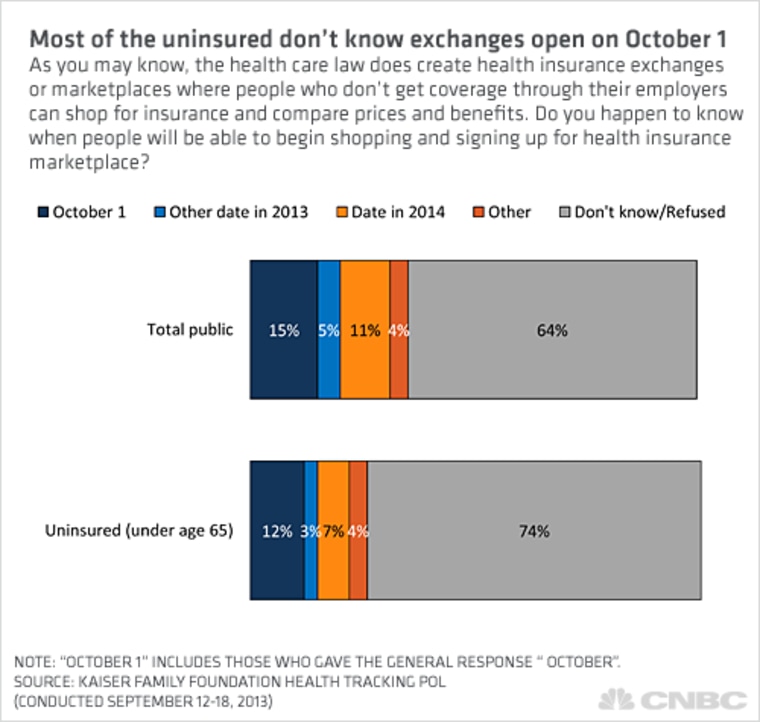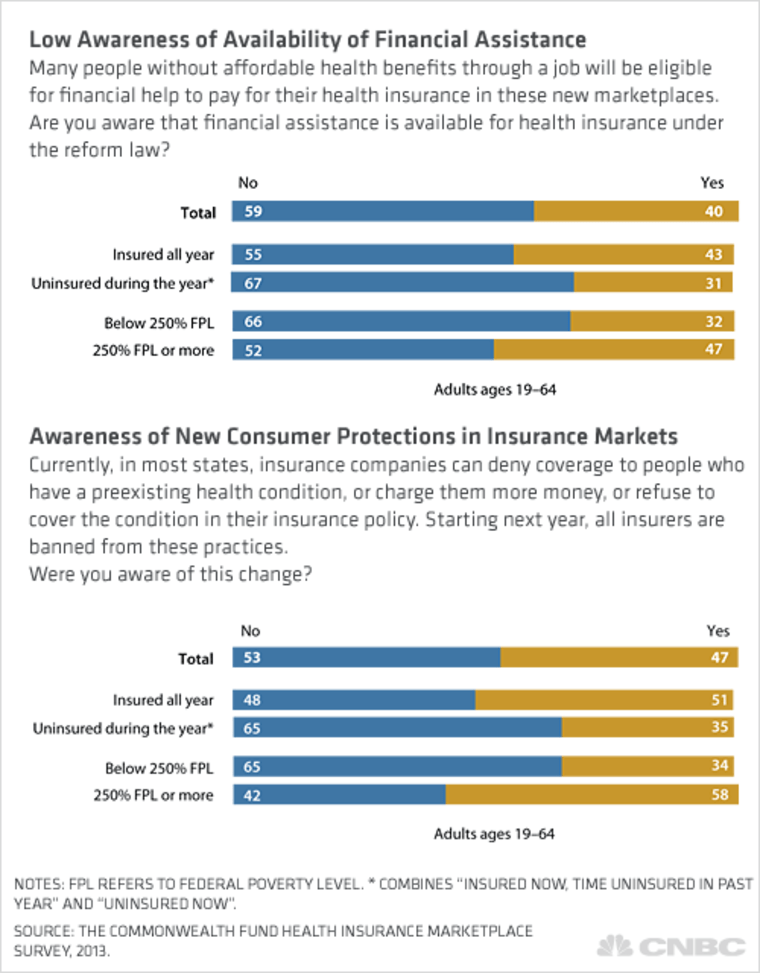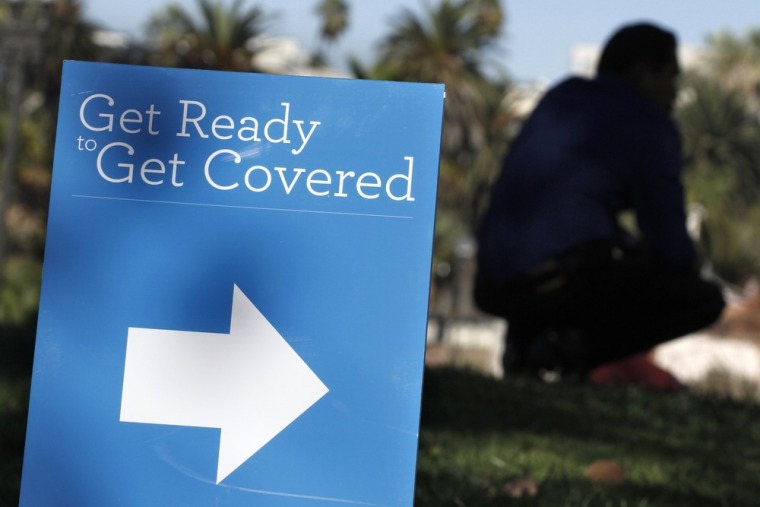A massive, billion-dollar effort to persuade millions of Americans to buy insurance on new Obamacare health exchanges is set to expand with Tuesday's opening of enrollment.
But the thousands of volunteers, government agencies, churches, unions, pharmacies, professional organizations, veterans of President Barack Obama's election campaign and celebrities doing that outreach face continued wide-spread ignorance among the public about the exchanges.
Matthew Shapero, a 28-year-old farmer in rural Northern California, is interested in buying insurance on his state's exchange, and he thinks many of his friends would benefit from doing the same.
"I would say more than half don't have insurance," Shapero said of his peers, who like most other Americans are mandated by the Affordable Care Act to get health insurance by 2014 or pay a penalty.
(Read more: Health exchanges: CNBC explains)
He expects many of those friends, who are young, educated and tend to support Obama, would be eligible for government subsidies to reduce the insurance's cost.
But, Shapero, who is seeking more affordable insurance after incurring $33,000 in medical bills this year from a broken leg and surgery, said, "I don't get the sense that they have been targeted" by outreach efforts.
"I don't know how many of them are actively looking forward to it, or even taking advantage of what's being put in place."
'Gaps' in outreach efforts
That's striking, because California for months has been distributing what will be a total of $40 million in federal funds to 250 organizations to promote enrollment on the Covered California exchange.
"We saw a few gaps in our outreach to our rural communities," acknowledged Covered California spokesman Larry Hicks. He said the outreach effort has been adjusted.
(Slideshow: 8 things about Obamacare you were afraid to ask)
Many other states, particularly those where the federal government is running their health insurance exchanges, are doing little to promote the marketplaces, where insurers will offering competing plans.
But the slack is being picked up by federal outreach efforts, as well as by private groups such as Enroll America, which is spending tens of millions of dollars and dispatching thousands of volunteers.

Enroll America's strategy includes going door-to-door in 10 states—Texas, Florida, Georgia, Arizona, North Carolina, New Jersey, Pennsylvania, Ohio, Michigan and Illinois.
Group founder Ron Pollack noted outreach efforts by others including Connecticut's exchange, which has distributed information at rock concerts it sponsored; pharmacy chains such as Walgreens and CVS, which have promoted the exchanges on their websites and in stores; and hospitals, which have been informing patients ''they can get insurance."
Celebrities such as Jennifer Hudson and Amy Poehler, who met with Obama over the summer to support the law, have also gotten into the act, as has pop singer Katy Perry. Perry last month re-tweeted a Twitter message from Obama to her more than 43 million followers that said, "If you're one of millions of young Americans w/out health insurance, you can get affordable coverage starting Oct. 1."
Pollack said the amount of outreach that's been done to date is "not even close" to what it will be after the exchanges open Tuesday and enrollment continues through March.
"Much of the advertising will occur later on," he said.
That will include what has been estimated as a $1 billion ad campaign by insurers, who are relying on enough younger, healthy people enrolling so that their premiums more than cover the benefits paid to people who get ill or who have pre-existing conditions.
(Read more: What's in a name? Lots, when it comes to Obamacare)
"This is not a sprint, this is a marathon," said Pollack. "We've got 182 dates in the enrollment period, and Oct. 1 is no more important than the other 181 days."
Confusion, misinformation
They'll need that time. A Kaiser Health Tracking poll released last week found that only 15 percent of the public, and just 12 percent of the uninsured were aware they can begin shopping in October on the exchanges opening in all 50 states and the District of Columbia.
Claudia Deane, who does polling for the Kaiser Family Foundation, said that in another new survey that examined California's young uninsured, "we looked at the folks in the income range that should be eligible for subsidies, and we found that 74 percent either said they weren't eligible or didn't know they would be eligible."

A Commonwealth Fund survey released Monday found just four in 10 adults are aware of the health exchanges, and only 32 percent of the uninsured knew about them. And just 31 percent of the uninsured were aware government subsidies are available to reduce insurance costs for many low- and middle-income people.
(Read more:Obamacare: CNBC Explains)
One of that survey's authors, Sara Collins, said, "I think it reflects that there's been a lot of conflict over the law, a lot of uncertainty over it. The conflict over it has probably confused people considerably."
Erin Hoben, who is leading outreach for the advocacy group Kentucky Voices For Health, said, "In a place like Kentucky, there's so much negative information out there, and people only believe what their elected officials or what Fox News is saying."
When Hoben started the job in July and talked to people about the exchanges established by the ACA "literally nobody had any idea what I was talking about, or they thought that it was struck down," she said. Even now, with growing awareness of the law, Hoben said, one women she recently spoke with believed she would be jailed if she didn't obtain insurance.
To overcome such opinions in the mountainous, rural state, Hoben said she "regularly drives eight hours in a day just to get to folks."
"I'll go to shelters," Hoben said. "I've been to meals provided by churches. I've also been hosting community meetings." Outreach workers also have hit the "Chicken Festival," the "Black Gold Festival," and county fairs.
And Legal Aid workers in Kentucky now ask every new client whether they have health insurance, and offer them information about the exchanges and Medicaid expansion, she said.
Enroll America's Pollack was in San Antonio recently as his volunteers pressed people in that Republican-led state, which voted overwhelmingly against Obama's re-election last fall, to participate in the exchanges that are the centerpiece of the president's health-care reform law.
Asked if his presence in the city where the Alamo is located was significant given the stakes of the effort, "There is," Pollack laughed and said, "Our side is going to win."
—By CNBC's Dan Mangan. Follow him on Twitter @_DanMangan.
